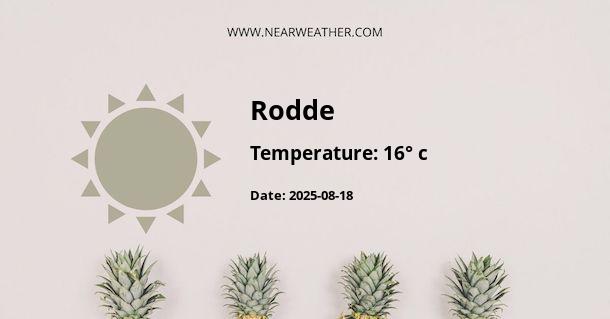Understanding the Climate and Weather Patterns of Rodde, Germany
Rodde, situated in the heart of Europe, boasts a climate that is often described as temperate and seasonal. The region is characterized by distinct fluctuations in weather patterns throughout the year, highlighting the diversity in temperature, precipitation, and daylight hours. To provide a comprehensive account of Rodde's climate, let's delve into its weather specifics, presenting tabulated data, statistical insights, and expert perspectives.
Overview of Rodde’s Climate Zones
As part of Germany, Rodde's climate falls under the Köppen climate classification as primarily a Temperate Oceanic Climate (Cfb). This classification indicates moderate temperatures, with no extreme highs in summer or lows in winter.
"The Oceanic climate in Rodde is characterized by the absence of a dry season, with precipitation evenly spread throughout the year, leading to lush landscapes and a rich agriculture sector," notes Dr. Annette Müller, a climate scientist at the Potsdam Institute for Climate Impact Research.
Seasonal Weather Patterns
Spring
- March - May: Transition period with increasing daylight and varying temperatures.
- Average Highs: Range from 8°C in March to 18°C in May.
- Average Lows: Range from 0°C in March to 8°C in May.
- Precipitation: Moderate with occasional showers, more frequent towards the end of the season.
Summer
- June - August: Warmer season with the highest temperatures and longer daylight hours.
- Average Highs: Range from 21°C in June to 24°C in August.
- Average Lows: Range from 11°C in June to 14°C in August.
- Precipitation: Although summers are relatively dry, convective rain can occur, leading to sporadic thunderstorms.
Autumn
- September - November: Cooling period with decreasing temperatures and daylight.
- Average Highs: Range from 19°C in September to 8°C in November.
- Average Lows: Range from 9°C in September to 2°C in November.
- Precipitation: Increases gradually, with November often being the wettest month.
Winter
- December - February: Coldest season with the least daylight hours.
- Average Highs: Range from 4°C in December to 3°C in February.
- Average Lows: Range from -1°C in December to -2°C in February.
- Precipitation: Usually lower than other seasons but can include significant snowfall.
Monthly Climate Averages for Rodde
| Month | Average High (°C) | Average Low (°C) | Precipitation (mm) |
|---|---|---|---|
| January | 3 | -2 | 60 |
| February | 4 | -1 | 45 |
| March | 8 | 0 | 50 |
| April | 13 | 3 | 45 |
| May | 18 | 7 | 55 |
| June | 21 | 11 | 70 |
| July | 23 | 13 | 75 |
| August | 24 | 13 | 65 |
| September | 19 | 10 | 55 |
| October | 14 | 6 | 60 |
| November | 8 | 2 | 65 |
| December | 4 | -1 | 70 |
Extreme Weather Phenomena
While Rodde experiences a generally mild climate, it is not exempt from extreme weather occurrences. Winters often bring periods of heavy snowfall which can lead to disruptions. In contrast, summer months might experience heatwaves, although these are less common in regions influenced by the Oceanic climate.
"It is crucial for inhabitants to prepare for the cold snaps and snowy winters that are characteristic of the region. Adequate measures like insulating homes and ensuring efficient heating systems are integral to weathering the colder months," states Heinrich Schultz, a local civil engineer who specializes in sustainable infrastructure.
Climate Change Considerations
Recent analytical data suggests that Rodde, like many parts of the world, is experiencing a shift in its historical climate patterns due to global climate change. This includes higher average temperatures, altered precipitation patterns, and an increase in extreme weather events.
"Research indicates that the impacts of climate change could magnify the intensity and frequency of extreme weather conditions in areas like Rodde. This can range from more severe storms to hotter than usual summer days," explains Professor Lena Hofer from the German Meteorological Society.
The Human and Ecological Impact
The climate and weather patterns in Rodde have a direct impact on its human and ecological systems. Agriculture, for instance, is heavily reliant on seasonal predictability, and shifts in this regard can affect crop yields. The local flora and fauna also fluctuate with these climatic changes, which can lead to alterations in biodiversity.
Adapting to Rodde's Weather and Climate
Residents and visitors to Rodde should remain cognizant of the shifting weather patterns and plan accordingly. Whether it's dressing in layers to accommodate the significant temperature differences between day and night or preparing for the expected precipitation throughout the year, a proactive approach is key to adapting to the local climate.
In conclusion, Rodde's climate and weather are hallmarks of its regional identity. A nuanced understanding of the seasonal variations, backed by statistical and scientific information, can augment the preparedness of those living in or visiting the area. Acknowledging the ongoing changes due to climate change will further empower communities and policymakers to make informed decisions that ensure resilience against the backdrop of an evolving natural landscape.
A - Rodde's Latitude is 52.283329 & Longitude is 7.516670.
A - Weather in Rodde is 3° today.
A - Climate Conditions in Rodde shows overcast clouds today.
A - Humidity in Rodde is 1% today.
A - Wind speed in Rodde is 23.9 km/h, flowing at 200° wind direction. today.
